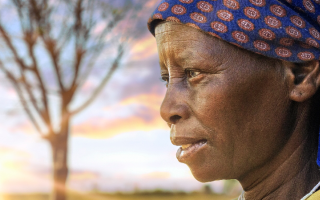
Your legal rights
The right of women to inherit from a deceased estate
In SA, no tradition may deny a woman her legal right to inherit if there is no Will.
Consider a situation where a man dies without a Will and he is survived by his wife and two daughters. The deceased's brother believes he is entitled to inherit the property and belongings of his brother as there are no male children born of the deceased. The deceased's wife is not aware of her rights, she is concerned that since males are recognised as leaders of the family in her culture, her late husband's brother will inherit the deceased estate and she will be at his mercy.
Traditional African culture in many instances recognises males as the leaders of the family. In the past, this often meant that the oldest male descendant also had the right to and authority over the wealth of the family. Women were left out of inheritances from deceased estates and those who had no male children would lose their inheritance to the closest male relative. The logic was that the male, as the recognised leader of the family, would utilise the wealth to care for those under their leadership. Sadly, there have been stories of abuse of power by these leaders where they disregard the women and children and fail to care for them. This article sheds light on the rights of women to inherit from deceased estates, even in cultures that recognise male leadership.
Customary law, which includes the role of traditional leaders, is recognised in section 211 of the Constitution. This means that customary law has not completely lost its relevance in modern day South Africa. However, where there is a contradiction between a person's constitutional rights and customary law, constitutional rights prevail. Furthermore, unfair discrimination on the basis of a person's gender is not allowed in terms of the Constitution and any cultural practice that discriminates against women unfairly on the basis of their gender could be declared against the Constitution.
The right of women to inherit from deceased estates versus a male's entitlement to inheritance in terms of customary law was exactly the issue the Constitutional Court had to decide on in Bhe v Khayelitsha Magistrate. The judgment was delivered back in October 2004 and declared that customary law which discriminated against women in matters of inheritance was unconstitutional. The full impact of this Constitutional Court ruling is that no culture in South Africa may disqualify a woman from inheriting simply on the basis that she is a woman, and a male leader of a family may not use his position or gender to take an inheritance which he is otherwise not entitled to.
Despite this decision being older than 20 years, there is still a misconception among some women who believe that they cannot inherit from their spouse or father. Under South African law, a person who dies without a Will and who is survived by a spouse and children will have their deceased estate distributed according to the rules, provided for under the Intestate Succession Act. According to the intestate rules where there is no Will, the belongings of the deceased will be distributed among the surviving spouse and/or children of the deceased. The rules do not make specific differentiation between genders and women are entitled to inherit from their spouse or father according to these rules.
It should also be noted that the law does not differentiate between children who were born while their parents were married and those who were born out of wedlock. This means that a female child born out of wedlock is entitled to inherit from her parents’ deceased estate, irrespective of there being no marriage between the parents. The fact that the female child might be using her mother's surname does not disqualify her. If there is no Will, then the child must be counted amongst the deceased's children and the child's portion must be equal to that of children born in the marriage.
The above deals with instances where there is no Will. South Africa provides for a principle known as freedom of testation, which allows a person to decide how their belongings must be distributed. This means that a person who wants to determine how their estate is distributed can declare in their Will who must inherit and what. A Will can be a powerful tool to protect one's daughters or other female loved ones from possible disputes over their right to inherit and from losing their inheritance where they might not be fully informed of their rights.
How can LegalWise assist?
We can assist you in the drafting and safekeeping of a Will under the GoldPLUS and Platinum Membership options. Platinum Members will also enjoy insurance cover for the drafting of a simple Will for every two years of paid-up Membership subject to a waiting period. Paralegal Assistance can also be provided through legal advice on various aspects, including advice on inheritance laws (subject to the terms and conditions of our Membership Agreement).
Did you know…No culture in South Africa may disqualify a woman from inheriting simply on the basis that she is a woman.